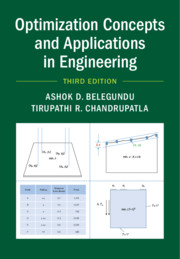Refine search
Actions for selected content:
1945 results in Engineering mathematics and programming
12 - Finite Element and Simulation-Based Optimization
-
- Book:
- Optimization Concepts and Applications in Engineering
- Published online:
- 31 May 2019
- Print publication:
- 06 June 2019, pp 409-447
-
- Chapter
- Export citation
5 - Constrained Minimization
-
- Book:
- Optimization Concepts and Applications in Engineering
- Published online:
- 31 May 2019
- Print publication:
- 06 June 2019, pp 182-253
-
- Chapter
- Export citation
10 - Dynamic Programming
-
- Book:
- Optimization Concepts and Applications in Engineering
- Published online:
- 31 May 2019
- Print publication:
- 06 June 2019, pp 375-388
-
- Chapter
- Export citation
Index
-
- Book:
- Optimization Concepts and Applications in Engineering
- Published online:
- 31 May 2019
- Print publication:
- 06 June 2019, pp 448-450
-
- Chapter
- Export citation
1 - Preliminary Concepts
-
- Book:
- Optimization Concepts and Applications in Engineering
- Published online:
- 31 May 2019
- Print publication:
- 06 June 2019, pp 1-42
-
- Chapter
- Export citation
7 - Direct Search Methods For Nonlinear Optimization
-
- Book:
- Optimization Concepts and Applications in Engineering
- Published online:
- 31 May 2019
- Print publication:
- 06 June 2019, pp 287-327
-
- Chapter
- Export citation
3 - Unconstrained Optimization
-
- Book:
- Optimization Concepts and Applications in Engineering
- Published online:
- 31 May 2019
- Print publication:
- 06 June 2019, pp 88-126
-
- Chapter
- Export citation
Preface
-
- Book:
- Optimization Concepts and Applications in Engineering
- Published online:
- 31 May 2019
- Print publication:
- 06 June 2019, pp xiii-xvi
-
- Chapter
- Export citation
4 - Linear Programming
-
- Book:
- Optimization Concepts and Applications in Engineering
- Published online:
- 31 May 2019
- Print publication:
- 06 June 2019, pp 127-181
-
- Chapter
- Export citation
Frontmatter
-
- Book:
- Optimization Concepts and Applications in Engineering
- Published online:
- 31 May 2019
- Print publication:
- 06 June 2019, pp i-iv
-
- Chapter
- Export citation
2 - One-Dimensional Unconstrained Minimization
-
- Book:
- Optimization Concepts and Applications in Engineering
- Published online:
- 31 May 2019
- Print publication:
- 06 June 2019, pp 43-87
-
- Chapter
- Export citation

Optimization Concepts and Applications in Engineering
-
- Published online:
- 31 May 2019
- Print publication:
- 06 June 2019
-
- Textbook
- Export citation
Appendix D - Linear and Nonlinear
-
- Book:
- Numerical Methods
- Published online:
- 26 April 2019
- Print publication:
- 09 May 2019, pp 786-787
-
- Chapter
- Export citation
Chapter 5 - Systems of Linear Equations
-
- Book:
- Numerical Methods
- Published online:
- 26 April 2019
- Print publication:
- 09 May 2019, pp 173-267
-
- Chapter
- Export citation
Chapter 10 - Interpolation for Equal Intervals and Bivariate Interpolation
-
- Book:
- Numerical Methods
- Published online:
- 26 April 2019
- Print publication:
- 09 May 2019, pp 389-444
-
- Chapter
- Export citation
Acknowledgments
-
- Book:
- Numerical Methods
- Published online:
- 26 April 2019
- Print publication:
- 09 May 2019, pp xxix-xxx
-
- Chapter
- Export citation
Chapter 9 - Finite Operators
-
- Book:
- Numerical Methods
- Published online:
- 26 April 2019
- Print publication:
- 09 May 2019, pp 364-388
-
- Chapter
- Export citation
Chapter 13 - Numerical Integration
-
- Book:
- Numerical Methods
- Published online:
- 26 April 2019
- Print publication:
- 09 May 2019, pp 509-575
-
- Chapter
- Export citation
Appendix A - Comparison of Analytical and Numerical Techniques
-
- Book:
- Numerical Methods
- Published online:
- 26 April 2019
- Print publication:
- 09 May 2019, pp 779-780
-
- Chapter
- Export citation
Frontmatter
-
- Book:
- Numerical Methods
- Published online:
- 26 April 2019
- Print publication:
- 09 May 2019, pp i-iv
-
- Chapter
- Export citation
